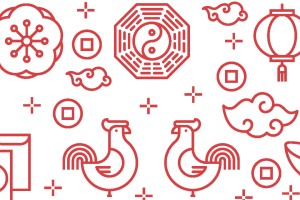The five ghosts or wu gui (五鬼) in Chinese is most commonly known as a reference to one of the palaces in the practice of 8 mansions feng shui.
As an unfavorable sector of the house, except when it is used for the kitchen location, the 5 ghosts area is identified by determining the sitting direction of a house.
When this is done, then the natal chart of the property can be determined. After which, the 5 ghosts location can be identified.
For example, if a house faces west, it would be sitting east. This would categorize it as a Chen house with the following energy map.
The location of the five ghost sector would then be at northwest as illustrated in the above diagram.
At a basic level, the 5 ghosts sector of the house is an unfavorable sector. Commonly used space such as living rooms, bedrooms and main doors should not be located in this area to avoid bad luck with enemies and backstabbers.
The only active living space that would be suitable for this area is, as mentioned earlier, would be the kitchen.
5 ghost carrying wealth
In recent years, the term 5 Ghost Carry Wealth has been frequently used as a glamorous way to refer to wealth energy enhancements that relate to the 5 ghost sector. And how certain types of cures and remedies can achieve that.
This could be from the basis that:
- A annual wealth star resides in the area
- A default wealth location situated in the area
- A favorable heavenly stem or earthly branch that found it’s way into the area
- etc
A big reason why this term is loosely used these days is that 5 ghost carrying wealth, which is called wu gui yun cai (五鬼運財) in Chinese, is that it’s one of the more popular concepts in feng shui such as the revered jade belt formation (yu dai huan yao) and castle gate configuration (城门诀).
So using this term catches the attention of those who have read up about feng shui schools of thought.
This is actually a misrepresentation of the actual meaning of 5 ghost carry wealth concept.
The 5 ghosts bringing wealth concept is actually a reference to a feng shui concept that is not related to the 5 ghosts in 8 mansions feng shui.
It uses advanced and lesser known feng shui technical knowledge to apply competently.
It involves flipping the stars of the bagua (翻卦) and later identifying the facing and “incoming water” direction. Furthermore, only specific layouts would be able to tap onto the 5 ghost correctly.
This is a realm of more advanced feng shui and beginners should not attempt to practice it because it wouldn’t be far fetched to suggest that 99 out of 100 would get it wrong. The one person who would get it right would be a professional feng shui practitioner.
And even if you get it right, your setup might create a conflict with other stars like the 5 yellow. Essentially creating a worse situation than if you had done nothing.
So even though the 5 ghost wealth concept can be very potent in calling on wealth luck, it is simply a theory too complex for feng shui hobbyists to undertake.
So to prevent readers from malpractice, the intricate details of how to set up this formation would not be discussed here.
Mistakes can result in the 5 ghosts bringing disaster rather than wealth.
And of course… surely you know that the word ghost here is a label and don’t really refer to anything related the supernatural.
This however, might not be said of a concept of the same name in Taoism.
5 ghost in Taoism
Another reason why the term 5 ghosts strikes a chord with feng shui enthusiasts is that the term is also used in Taoist practices and sorcery.
But they are not the same thing.
Taoists reference to the 5 ghost actually refer to spiritual entities that Taoist priest call on when creating talismans and conducting rituals.
These are “magic” and “spells” meant to either bring good luck, protect oneself from harm, or even to do harm onto enemies.
There are actually different subsets of the 5 ghosts (or 5 spirits). And one group of them can sometimes be applied to property because of their association with directions and wealth.
This is a ritual that is commonly practiced by Chinese businesses where they set up altars in the business premises to call on the 5 wealth spirits to bring business luck to the company. This is why when observing these altars, we can often observe that there are 5 sets of offerings maybe in the form of a drink or snack placed on the altar.
The fame of the Taoist practice of 5 ghost concepts is probably another big reason why the term 5 ghosts catches the attention of feng shui beginners.
At this point, it should be noted that even though spells and magical rituals are not feng shui, they do belong to a branch of the 5 arts in Chinese metaphysics. Feng shui comes under a different branch. So they are like different branches sprouting from the same tree.
Without going into the meticulous details of how these rituals such as the wealth transfer spell (五鬼運財法) is conducted, just know that you should be careful not to confuse Taoist practice and feng shui.
















